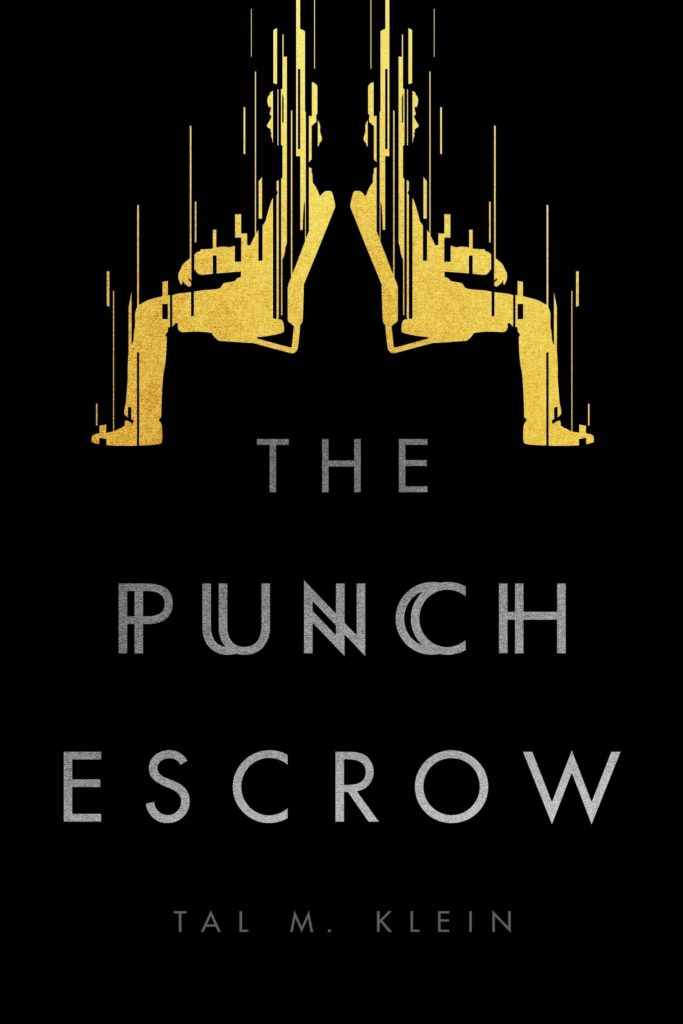
The Punch Escrow, by Tal M. Klein
Words By LeeAnn Adams
How does one form an identity, a claim of existence? Thomas Mann declared, “No one remains quite what he was when he recognizes himself.” This is certainly true when Joel Byram is accidentally cloned and forced to confront his other self in The Punch Escrow.
Byram, the narrator, and the first of the two Joels, lives an unremarkable life before his fateful replication. He’s married to a brilliant scientist who works at a top-secret teleportation corporation and who also performs all the heavy lifting in their marriage. He works from home where he “salts” (tests) Artificially Intelligent Digital Entities, or AIDEs, attempting to create a more realistic façade of sentience. Infatuated with 1980s pop culture—despite the book’s time of roughly 167 years after the beginning of that iconic decade—he’s also a jerk, and generally oblivious to his abrasiveness.
As a last-ditch effort to be less passive in his marriage, Byram agrees to a Costa Rican vacation with his wife. A suicide bomber spectacularly disrupts this attempt by blowing up the teleportation center where Byram attempts to travel. The bomber, who likens herself to the first fictional female pope, Joan Anglicus, should have killed him. Instead, Byram’s wife, already in Costa Rica, panics and forces the teleportation center to reconstruct him. What she doesn’t know until later is that Byram survived—wholly intact—in New York, and this new man she fabricated is a clone. When outrageous corporate, pseudo-religious, and secret agent villains catch wind of this dual existence, Byram suddenly becomes remarkable for the worst reasons.
Geek & Sundry, an imprint of Inkshares, markets The Punch Escrow as hard science fiction and it does not disappoint. Tal M. Klein isn’t afraid to play with form in the novel, writing short and choppy chapters while also tucking in footnotes with an academic quality reminiscent of a textbook, the extent of which can sometimes take up half a page or more. Klein goes into great detail about the technologies existent in the year 2147, covering topics such as teleportation mechanics, complex communication devices, and mosquitoes that ingest pollution and urinate water. This bold approach to telling a story creates a wonky effect on the pace of the narrative that will appeal only to the most patient of readers. It is, however, a nice play on the theme of the unreliability of time and space.
For all the fancy gadgets, the crux of Klein’s story is that when we’re faced with ourselves, we don’t always like what we see. Byram is forced to confront himself, literally, during this unexpected journey, and it makes him think seriously about how he treats other people. What makes this character so likable in spite of himself is that he is indeed an ordinary guy. When faced with an insurmountable problem, Byram has to muddle his way through with his salting skills and sheer determination. A great deal of comedy and injury comes of this, which in turn creates a realistic underdog hero quite different from the likes of Peter Parker and Ender Wiggin.
The Punch Escrow is an audacious novel for Geek & Sundry to promote as their starting title. Challenging and yet reminiscent of the best-selling techno thrillers, it’s a novel that readers most definitely will remember.